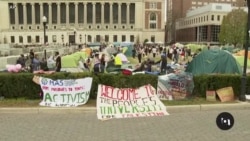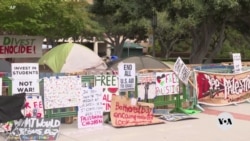Student Union
Columbia University demonstrators in talks with administration officials
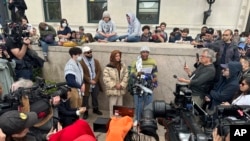
Officials at Columbia University were continuing talks Wednesday with student demonstrators from the Gaza Solidarity Encampment as the protest reaches a full week.
At 9:41 p.m. Tuesday, university President Nemat “Minouche” Shafik sent an email to the Columbia community setting a midnight deadline for an agreement to be reached about dismantling the encampment and dispersing the protesters.
“I very much hope these discussions are successful,” she wrote. “If they are not, we will have to consider alternative options for clearing the West Lawn and restoring calm to campus so that students can complete the term and graduate.”
As midnight passed, Columbia University Apartheid Divest posted a statement on X saying, “We refuse to concede to cowardly threats and blatant intimidation by university administration. We will continue to peacefully protest.”
The statement also said the university had threatened to call the National Guard. But after visiting the university earlier in the week, New York Governor Kathy Hochul said Tuesday she had no plans to deploy the National Guard.
As midnight approached on Tuesday, a student organizer announced that the deadline had been extended to 8 a.m. Wednesday.
At 4:09 a.m., the Office of the President sent an email saying the discussion deadline would be extended for 48 hours, given the constructive dialogue, and the university would report back on progress.
The email announced that leaders of the student encampment had agreed to remove a significant number of tents, get non-Columbia affiliates to leave the encampment and comply with New York Fire Department requirements. They also agreed to ensure that the encampment is “welcome to all” and to prohibit “discriminatory or harassing language.”
This development comes nearly a week after more than 100 students were arrested at the school on April 18, after Shafik authorized police to clear away protesters. Some of the students received suspension notices from the school.
Columbia’s action prompted an onslaught of pro-Palestinian demonstrations at other universities and responses from faculty and politicians.
Students at other campuses, such as Yale, Stanford and New York University, have also rallied around the Palestinian cause, calling for their universities to divest from companies with ties to Israel and for a cease-fire in Gaza. Many also have put up tent encampments on their campuses. About 150 students and faculty were arrested at New York University Monday night.
Columbia also announced Tuesday morning that classes on the Morningside main campus, where the protests are taking place, will be offered in a hybrid format for the remainder of the spring semester. The last day of classes is April 29.
See all News Updates of the Day
Columbia University cancels main commencement after protests that roiled campus for weeks
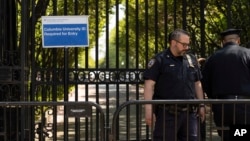
Columbia University is canceling its large university-wide commencement ceremony amid ongoing pro-Palestinian protests but will hold smaller school-based ceremonies this week and next, the university announced Monday.
"Based on feedback from our students, we have decided to focus attention on our Class Days and school-level graduation ceremonies, where students are honored individually alongside their peers, and to forego the university-wide ceremony that is scheduled for May 15," Columbia officials said in a statement.
The protests stem from the conflict that started Oct. 7 when Hamas militants attacked southern Israel, killing about 1,200 people, mostly civilians, and taking roughly 250 hostages. Vowing to destroy Hamas, Israel launched an offensive in Gaza that has killed more than 34,500 Palestinians, about two-thirds of them women and children, according to the Health Ministry in the Hamas-ruled territory. Israeli strikes have devastated the enclave and displaced most of its inhabitants.
The University of Southern California earlier canceled its main graduation ceremony while allowing other commencement activities to continue.
- By VOA News
Where Are Pro-Palestinian Campus Protests Happening?
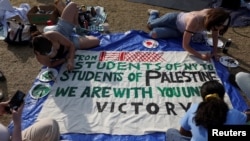
Colleges in the U.S. have been rocked by a wave of campus protests calling for an end to the war in Gaza, and for U.S. colleges to divest from Israel.
The Wall Street Journal’s Steven Russolillo rounds up some of the most important ones. (April 2024)
Pro-Palestinian protests in US could impact 2024 election
Despite the fact that many of their encampments at university campuses have been dismantled, pro-Palestinian demonstrators in the United States are standing their ground. If the protests continue, some analysts say they could have an impact on the 2024 presidential election. VOA’s Veronica Balderas Iglesias explains.
- By VOA News
Pro-Palestinian protest ends quietly at University of Southern California
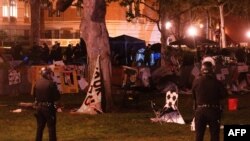
Pro-Palestinian protesters at an encampment at the University of Southern California, one of the focal points of anti-Israel protests across U.S. college campuses, left the scene early Sunday after authorities warned them that they could be arrested.
Their departure came after university safety officers and Los Angeles police began clearing the center of campus, where police had arrested 93 people on April 24.
"If you are in the center of campus, please leave,” the university warned the protesters on the social media platform X, saying they could be arrested if they stayed.
Elsewhere, pro-Palestinian protests continued at several college graduation ceremonies on Saturday.
At the University of Virginia, 25 people were arrested for trespassing after police clashed with pro-Palestinian protesters who refused to remove tents from the campus.
At the University of Michigan, demonstrators chanted anti-war messages and waved flags during graduation ceremonies. More protests occurred at Indiana University, Ohio State University, Princeton University in New Jersey and Northeastern University in Massachusetts.
- By VOA News
Amid internship pressure, international students should focus on self-care
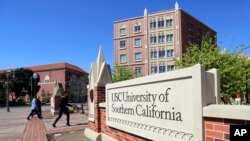
That’s the argument of Edhita Singhal, an international student from India studying at the University of Southern California.
Despite the fear of not finding a good internship, it’s important to relax and take care of yourself, she writes in her biweekly column for campus newspaper The Daily Trojan. (April 2024)




